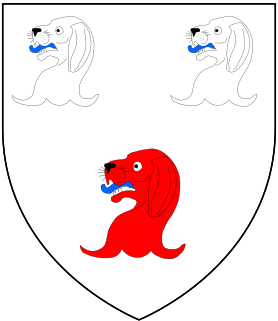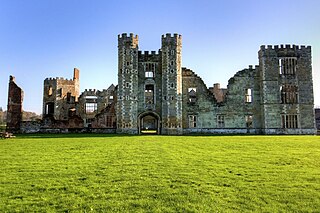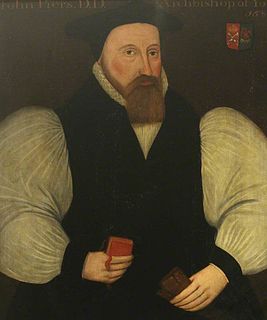Related Research Articles

Salisbury is a cathedral city in Wiltshire, England, with a population of 40,302, at the confluence of the rivers Avon, Nadder and Bourne. The city is approximately 20 miles (32 km) from Southampton and 30 miles (48 km) from Bath.

Marquess of Exeter is a title that has been created twice, once in the Peerage of England and once in the Peerage of the United Kingdom. The first creation came in the Peerage of England in 1525 for Henry Courtenay, 2nd Earl of Devon. For more information on this creation, which was forfeited in 1538, see the Earl of Devon.

Baron Feversham is a title that has been created twice, once in the Peerage of Great Britain and once in the Peerage of the United Kingdom. The first creation, in the Peerage of Great Britain, came in 1747 when Anthony Duncombe, who had earlier represented Salisbury and Downton in the House of Commons, was made Lord Feversham, Baron of Downton, in the County of Wilts. He had previously inherited half of the enormous fortune of his uncle Sir Charles Duncombe. However, Lord Feversham had no sons and the barony became extinct on his death in 1763. The peerage was revived in the Peerage of the United Kingdom in 1826 in favour of his kinsman Charles Duncombe, who was created Baron Feversham, of Duncombe Park in the County of York. He was a former Member of Parliament for Shaftesbury, Aldborough, Heytesbury and Newport. Duncombe was the grandson of Thomas Duncombe, son of John Brown by his wife Ursula Duncombe, aunt of the first Baron of the 1747 creation. Ursula had inherited the other half of her brother Sir Charles Duncombe's fortune. Lord Feversham son, the second Baron, sat as a Conservative Member of Parliament for Yorkshire and the North Riding of Yorkshire.
Baron Rockley, of Lytchett Heath in the County of Dorset, is a title in the peerage of the United Kingdom. It was created on 11 January 1934 for the Conservative politician Sir Evelyn Cecil, who had earlier represented Hertfordshire East, Aston Manor and Birmingham Aston in the House of Commons. He was the son of Lord Eustace Cecil, fourth son of James Gascoyne-Cecil, 2nd Marquess of Salisbury. The first baron was married to the horticulturist Alicia Amherst. As of 2019 the title is held by their great-grandson, the fourth baron, who succeeded his father in 2011.

Robert Arthur James Gascoyne-Cecil, 5th Marquess of Salisbury,, known as Viscount Cranborne from 1903 to 1947, was a British Conservative politician.

Richard Anthony Salisbury, FRS was a British botanist. While he carried out valuable work in horticultural and botanical sciences, several bitter disputes caused him to be ostracised by his contemporaries.
In the United Kingdom there are at least six Lords Commissioners of Her Majesty's Treasury, serving as a commission for the ancient office of Lord High Treasurer. The board consists of the First Lord of the Treasury, the Second Lord of the Treasury, and four or more junior lords to whom this title is usually applied.

Cowdray House consists of the ruins of one of England's great Tudor houses, architecturally comparable to many of the great palaces and country houses of that time. It is situated in the Parish of Easebourne, just east of Midhurst, West Sussex standing on the north bank of the River Rother. It was largely destroyed by fire on 24 September 1793, but the ruins have nevertheless been Grade I listed.

John Piers (Peirse) was Archbishop of York between 1589–1594. Previous to that he had been Bishop of Rochester and Bishop of Salisbury.
Sir John Herbert was a Welsh lawyer, diplomat and politician who sat in the House of Commons at various times between 1586 and 1611. He was Secretary of State under Elizabeth I and James I.
Sir John Bennet was a judge and politician who sat in the House of Commons between 1597 and 1621. His career ended in controversy after he was found guilty of extorting bribes and excessive fees.
Sir Nathaniel Brent was an English college head.
Sir Thomas Gorges was an Elizabethan courtier and Groom of the Chamber to Queen Elizabeth I. By his great-grandmother, Lady Anne Howard, daughter of John Howard, 1st Duke of Norfolk, he was a second cousin of queens consort Anne Boleyn and Catherine Howard.
Valentine Dale was an English jurist and diplomat. He served as Judge of the High Court of Admiralty from 1584 to 1589.

The Exclusion Bill Parliament was a Parliament of England during the reign of Charles II of England, named after the long saga of the Exclusion Bill. Summoned on 24 July 1679, but prorogued by the king so that it did not assemble until 21 October 1680, it was dissolved three months later on 18 January 1680/81.
John Salisbury may refer to:
Edward Tooker was an English lawyer, landowner and politician who sat in the House of Commons at various times between 1654 and 1664.
Anthony Wingfield (1550?–1615?), one of a number of figures from the same family of his period, was an English scholar and Member of Parliament, known as reader in Greek to Queen Elizabeth I.
Roger Gauntlett of Bulhall House, Salisbury, Wiltshire was an English member of the Parliament of England for Salisbury between of 1614 and 1624.
References
- ↑ "WEEKES, Anthony (d.1573), of Crane Street, Salisbury, Wilts. - History of Parliament Online". www.historyofparliamentonline.org.
| This article about a 16th-century Member of the Parliament of England is a stub. You can help Wikipedia by expanding it. |